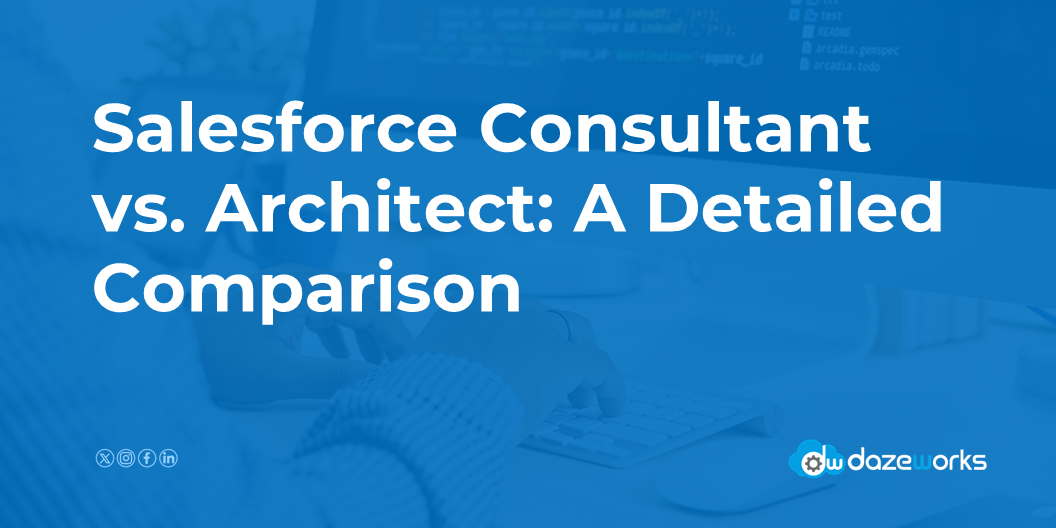
Salesforce Consultant vs. Salesforce Architect: A Detailed Comparison
minutes read
In the ever-evolving technological innovation landscape, Salesforce is a premier platform that helps organizations streamline their operations and improve customer engagement. To maximize the benefits of Salesforce, businesses often seek the expertise of professionals like Salesforce Consultants and Salesforce Architects. While these roles may seem similar, they have distinct responsibilities and skill sets. This blog delves into the differences between a Salesforce Consultant and a Salesforce Architect, helping you understand which role best suits your needs or career aspirations.
Salesforce Consultant
A Salesforce Consultant is a professional who works closely with clients to understand their business processes and requirements and then translates these into effective Salesforce solutions. They are involved in the implementation, customization, and optimization of Salesforce to meet the specific needs of the business.
Key Responsibilities
- Requirement Gathering: Collaborating with stakeholders to gather and analyze business requirements.
- Solution Design: Designing Salesforce solutions that align with business processes and goals.
- Configuration and Customization: Setting up Salesforce features, including workflows, reports, dashboards, and data management.
- User Training: Providing training and support to end-users to ensure effective use of Salesforce.
- Ongoing Support: Offering post-implementation support and optimization to ensure the solution continues to meet business needs.
Skill Set
- Strong understanding of Salesforce features and capabilities.
- Excellent communication and interpersonal skills.
- Ability to translate business requirements into technical solutions.
- Proficiency in Salesforce configuration, including workflows, process builder, and reports.
- Basic knowledge of coding (Apex and Visualforce) is advantageous, but not always necessary.
Salesforce Architect
A Salesforce Architect, on the other hand, is a senior-level professional who designs and oversees the implementation of complex Salesforce solutions. They ensure that the architecture is scalable, secure, and aligned with the overall IT strategy of the organization.
Key Responsibilities
- Strategic Planning: Developing a long-term Salesforce strategy that aligns with business goals.
- Solution Architecture: Designing high-level architecture and integration solutions that meet business requirements.
- Technical Leadership: Providing technical guidance and leadership to development teams.
- Integration Management: Ensuring seamless integration of Salesforce with other systems and platforms.
- Governance: Establishing governance frameworks and best practices for Salesforce usage and data management.
Skill Set
- Deep knowledge of Salesforce architecture and best practices.
- Extensive experience with Salesforce development (Apex, Visualforce, Lightning Components).
- Strong understanding of integration patterns and middleware.
- Proficiency in data modeling and security practices.
- Excellent problem-solving and analytical skills.
- Ability to lead and mentor technical teams.
Key Differences
| Basis | Salesforce Consultant | Salesforce Architect | Scope of Work | Focuses on understanding and implementing solutions based on specific business needs. | Focuses on designing and overseeing the implementation of complex, scalable solutions that align with the organization’s IT strategy. |
| Technical Depth | Requires a strong understanding of Salesforce configuration with some development knowledge. | Requires deep technical expertise in Salesforce development, integration, and architecture. |
| Strategic Involvement | Primarily involved in project-level tasks and client interactions. | Involved in strategic planning and high-level decision-making to ensure the long-term success of Salesforce implementations. |
| Leadership | May lead small teams or projects, focusing on delivering specific solutions. | Provides technical leadership to large teams, guiding the overall architectural direction and ensuring best practices. |
| Career Path | Many Salesforce Consultants start their careers in roles such as Business Analysts or Salesforce Administrators before moving into consultancy. With experience, they can advance to senior consultant roles or specialize in specific Salesforce products. | Salesforce Architects often begin their careers as Salesforce Developers or Technical Leads. With substantial experience and expertise, they can progress to the architect role, eventually becoming Chief Technology Officers (CTOs) or similar executive positions |
| Certifications |
|
|
Conclusion
Salesforce Consultants and Salesforce Architects play crucial roles in the successful implementation and optimization of Salesforce solutions. While a consultant focuses on understanding and meeting specific business needs through configuration and customization, an Architect ensures that the overall solution is scalable, secure, and strategically aligned with the organization’s IT framework.
Choosing between these roles depends on your business needs or career goals. If your organization requires tailored solutions and ongoing support, a Salesforce Consultant may be the right choice. However, if you need a high-level strategic vision and technical leadership for complex projects, a Salesforce Architect would be more suitable.
